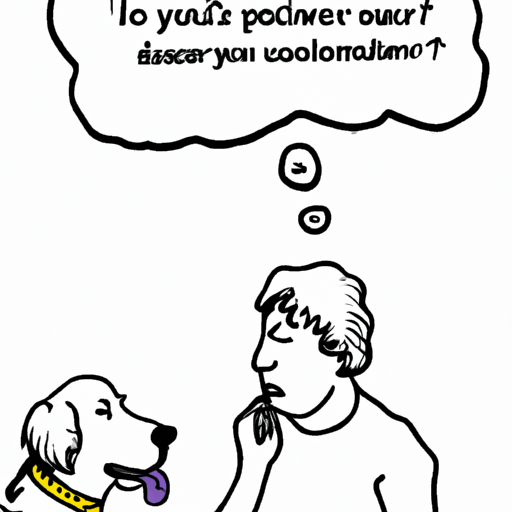As a dog owner, you’ve likely observed your furry friend engaging in various behaviors that make you tilt your head in confusion. One such behavior is the act of frequent paw licking. While it might seem like a harmless, quirky trait at first glance, excessive paw licking can actually be a sign of underlying issues that need to be addressed.
Table of Contents
- Understanding the Basics
- Reasons for Excessive Paw Licking
- How to Address the Problem
- Preventing Paw Licking
- Frequently Asked Questions
Key Takeaways
- Dogs lick their paws for a variety of reasons, including grooming, allergies, pain, and anxiety.
- Excessive paw licking can lead to further complications such as infections or skin conditions.
- Observing your dog’s behavior and consulting with a veterinarian can help identify the root cause.
- Prevention strategies include regular grooming, dietary changes, and providing mental stimulation.
Understanding the Basics
Just like humans, dogs have their unique set of behaviors that serve various functions. Paw licking is a common behavior in dogs and is usually a part of their grooming ritual or a response to a minor irritation. However, when your dog licks their paws excessively, it could be indicative of more serious problems. This behavior can lead to a condition called acral lick dermatitis, or lick granuloma, which is a skin wound caused by constant licking.
Reasons for Excessive Paw Licking
There are several reasons why dogs might engage in excessive paw licking.
1. Allergies: Allergies are one of the most common reasons for excessive paw licking. Dogs can be allergic to a variety of things, including certain types of food, pollen, dust mites, and even some cleaning products used around the house. Allergies can cause itchiness and discomfort, leading your dog to lick their paws for relief.
2. Pain or Discomfort: Dogs might lick their paws if they’re in pain. This could be due to a splinter, a thorn, a broken nail, or even arthritis. Paw licking is their way of trying to soothe the painful area.
3. Anxiety or Boredom: Dogs might resort to paw licking as a coping mechanism for anxiety or boredom. This is similar to how humans might bite their nails or fidget when they’re nervous or bored.
4. Skin Conditions: Certain skin conditions such as yeast infections, dry skin, or parasites can cause your dog’s paws to itch, leading to excessive licking.
To understand the root cause of your dog’s excessive paw licking, it’s essential to observe their behavior and consult with a vet. An excellent guide on understanding dog behavior can be of great help in such situations.
How to Address the Problem
Addressing your dog’s excessive paw licking involves identifying the underlying cause and taking the necessary steps to alleviate it.
1. Consult a Veterinarian: If your dog’s paw licking seems excessive, your first step should be to consult a veterinarian. They can help identify the cause and provide appropriate treatment if necessary.
2. Make Dietary Changes: If your dog’s paw licking is due to food allergies, changing their diet might be necessary. This article on food allergies in dogs could be a helpful resource.
3. Provide Mental Stimulation: If boredom or anxiety is causing your dog’s paw licking, providing more mental stimulation can help. This could involve more playtime, walks, or even puzzle toys.
4. Regular Grooming: Regular grooming can help prevent skin conditions that might lead to excessive paw licking. This includes regular baths with dog-appropriate shampoos and keeping your dog’s nails trimmed. More tips on grooming can be found here.
Preventing Paw Licking
Preventing paw licking involves regular care and ensuring that your dog is physically and mentally healthy.
1. Regular Veterinary Check-ups: Regular check-ups can help catch any potential health issues early, before they lead to behavior like excessive paw licking.
2. Proper Nutrition: Providing your dog with a balanced diet can help prevent skin conditions and allergies.
3. Regular Grooming: As mentioned before, keeping your dog clean and well-groomed can help prevent many of the issues that lead to excessive paw licking.
4. Mental Stimulation: Keeping your dog mentally stimulated and active can help prevent behavior caused by boredom or anxiety.
Frequently Asked Questions
1. Why does my dog lick his paws after eating?
This could be a sign of food allergies. If your dog consistently licks their paws after eating, it might be worth consulting a vet.
2. How do I stop my dog from licking his paws raw?
If your dog is licking their paws to the point of causing injury, it’s essential to consult a vet. They can provide appropriate treatment and help identify the underlying cause.
3. Are certain breeds more prone to paw licking?
Certain breeds with a predisposition to allergies, such as Bulldogs or Retrievers, might be more prone to paw licking. However, any dog can develop this behavior.
In conclusion, while paw licking is a common behavior in dogs, excessive paw licking can be a sign of underlying issues. By understanding the causes and taking preventative measures, you can ensure that your dog stays healthy and happy. For more information on dog health and behavior, check out this resource.



